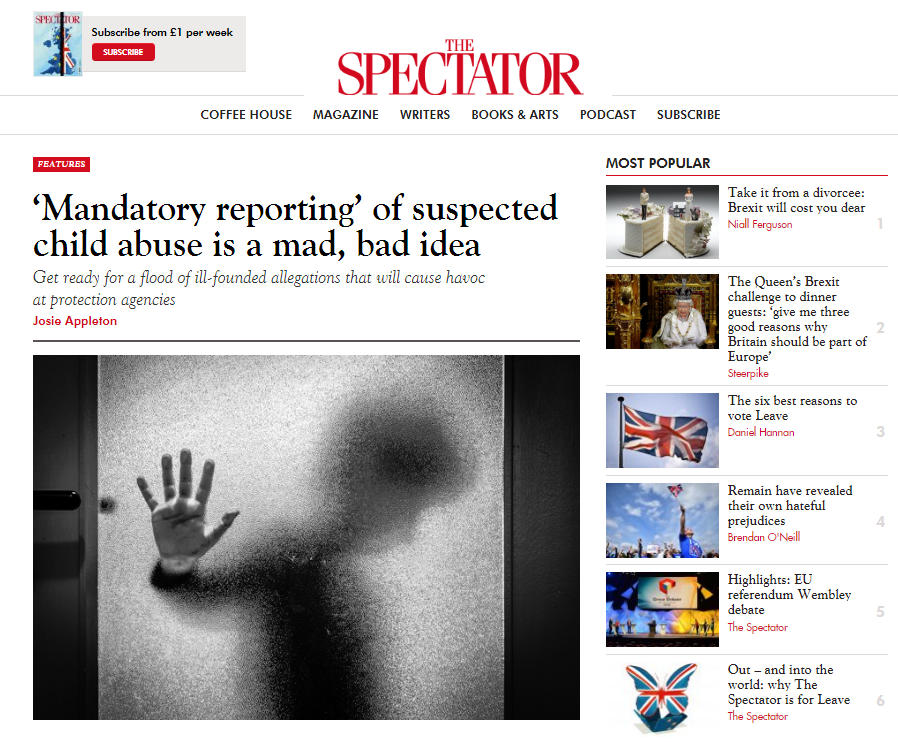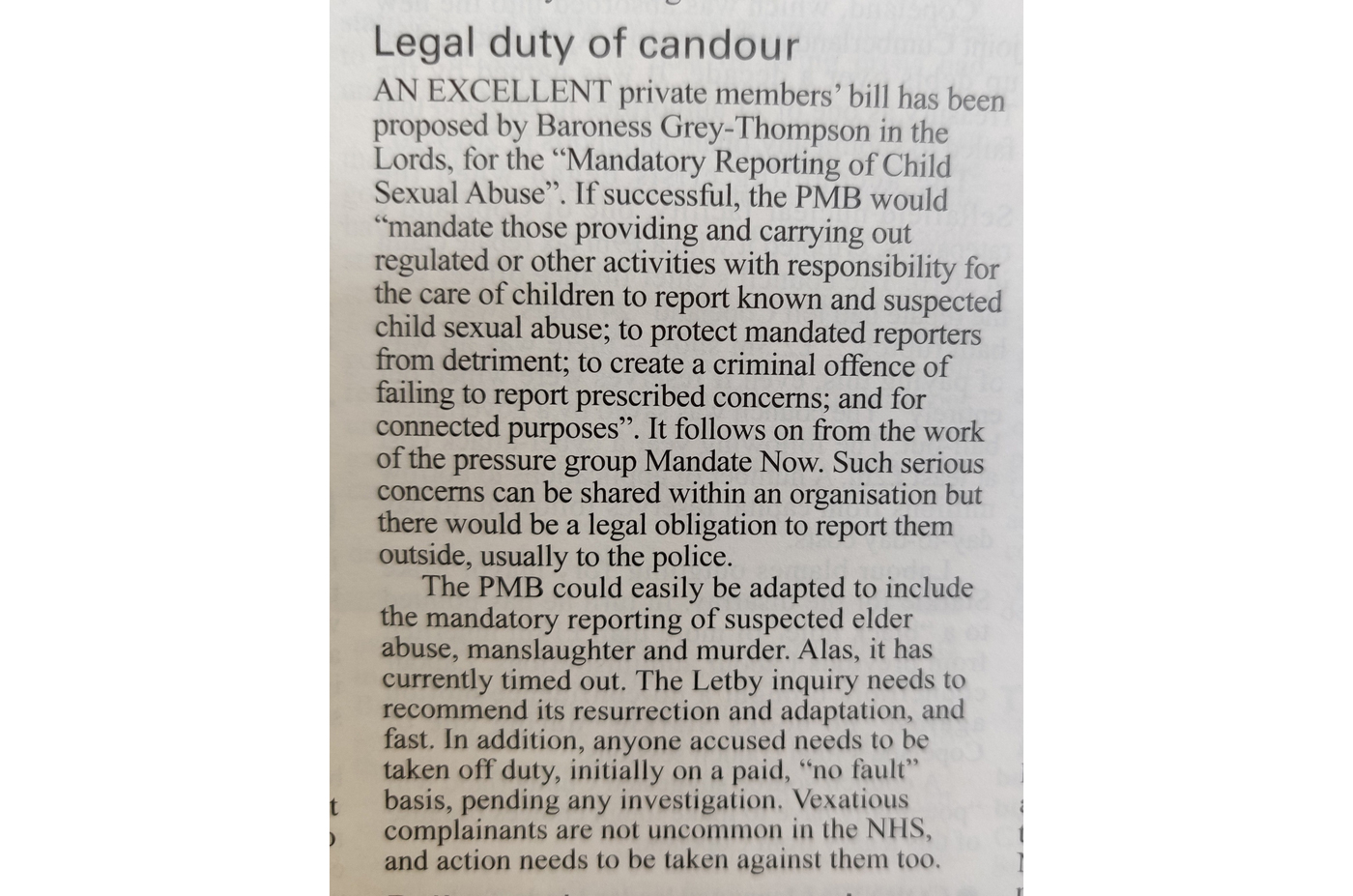On 22.6.16 the Spectator published an article by Josie Appleton who does not appear to be a regular contributor. She is convener for a pressure group that writes against regulations in everyday life. She also periodically contributes to the Guardian. Clearly Mandatory Reporting seems to be considered a soft target to which, just like any other piece of proposed legislation, Ms Appleton can contribute using her adult logic without appreciating the first two rules of child protection are (i) suspend adult logic (ii) apply significant experience because it is a complex subject. The piece is available here
There are several points of interest in the article. Firstly that it appeared in this Conservative publication at this time at all. The Government has repeatedly deferred the consultation ‘reporting and acting on child abuse and neglect’ despite there being no reason for delay. We understand it was ready to begin in December 15 and that it might now be launched just before the recess. Let’s not forget Mr Cameron described child abuse as a ‘national threat.’
Within the article there is a thumb print that suggests Ms Appleton was briefed by the Department for Education media team. The idea that referrals from Mandated reporters are poor, while referrals from elsewhere are reliable is pure DfE fantasy spin.
The Spectator declined to publish a comment from a reader maybe because it was too long or perhaps because of embedded links to evidence.
The post was sent to MN this morning and we publish it below with a few small edits. The Spectator has now published a truncated version:
Oh dear! What an ill-informed and misleading article.
- Cameron hasn’t spoken in favour of mandatory reporting with a penalty of 5 years for non-reporting, he spoke in favour of a law on “wilful neglect” which is something quite different and almost impossible to prove which won’t change child protection culture in any way at all. It was just Cameron deciding to have a pop at another group of public sector staff, in this case social workers.
- Mandatory reporting in countries such as the USA, Canada and Australia hasn’t resulted in thousands of ill-founded or-unverifiable reports. The most recent research from Australia confirms that the introduction of mandatory reporting there has significantly increased the number of substantiated reports from mandated reporters. The conclusion of author Professor Ben Mathews of Queensland University of Technology was “The results of this research suggest a mandatory reporting law for CSA is associated with a substantial and sustained increase in identification of cases of CSA. Societies which are considering the introduction of a mandatory reporting law for CSA should find support for this policy intervention from these findings, while recognizing the associated needs for reporter education, investment in agency capacity and service provision, and the need to implement responses to reports with sensitivity.”
- Without proper support it is really hard to summon the courage to report. The natural thing to do is ask “what if I’m wrong?” It’s often easier to say nothing. The author has piled on the pressure in that direction with her talk of “the harm done to families and-professionals by thousands of unfounded accusations”. It is a pity that no mention is made of the devastating and often lifelong harm to children that results from abuse going unreported and undetected. Non-reporting is far more common than you might think, and results in prolific serial abusers such as William Vahey getting away with their crimes for decades, or of Nigel Leat, where other staff noticed concerning behaviour on over 30 occasions over fifteen years and none of those concerns were forwarded to children’s services
- Actually Michael Gove is on record as having had a change of heart in favour of mandatory reporting and announced a review of MR prior to his move to Chief Whip which introduced a new Secretary of State.
- It isn’t a myth that there is an epidemic of hidden abuse. Research by the Children’s Commissioner for England concludes that only 1 in 8 cases of child sex abuse comes to the attention of the authorities. That’s a awful lot of unreported abuse. Yes, I’d call it an epidemic.
- The institutions that carried out the abuse-cover-ups of the past do still exist. As an example one school, knowing that a member of staff had abused, instead of reporting it consulted the school’s solicitors to see if they had to report. The lawyers said no. Nothing in the law has since stopped this recurring. In fact non of the fundamentals of child protection have changed.
- The Rochdale scandal had very little to do with the mandatory reporting question. Although under-reporting probably happened, the key problem was that local authority social services and the police simply chose to do nothing for a variety of reasons. Professor Jay didn’t conclude that the primary problem was fear of pointing fingers at the Pakistani community, but rather that the children, often from troubled backgrounds, were thought not worth trying to help.
A notable exclusion from the article is any proposal from Josie Appleton that addresses the ‘national threat’ of child abuse as Mr Cameron designated it in March 2015.
So, an error of fact in almost every paragraph, and not a single proposal in sight. But why would there be, that takes experience and understanding of the very complex subject of child protection in Regulated Activities.
Apart from that, the article is wonderful.


